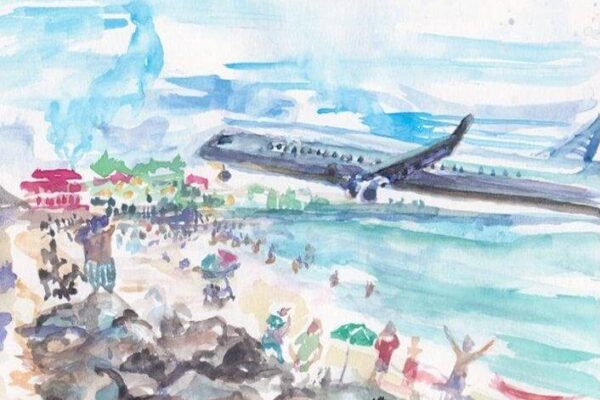VID-19 appeared first on the Chinese radar screen at the end of December 2019 and became part of the global dialogue at the beginning of 2020. The World Health Organization (WHO) declared the virus a pandemic on March 12, 2020, and since then the virus has touched every aspect of the world economy including but not limited to health-care, politics, government, socio-cultural systems, agriculture, climate, religion, entertainment, hospitality, travel and tourism.
More than 17.2 million people have been diagnosed with COVID-19 and in excess of 10 million patients have recovered; at least 673,000 have died, according to reports from John Hopkins University.
Bad and Getting Worse

As of April, 2020, business closures, aimed at restricting movement and the spread of the virus affected 81 percent of the global workforce (ILO, 2020), and the impact on the worldwide tourism industry has been profound with a predicted loss of 100.8 million jobs. The area projected to see the biggest loss from COVID-19 is in the Asia Pacific region, losing approximately 63.4 million jobs, while Europe will take the second largest hit with a forecasted employment loss of 13 million (www.statista.com/statistics/1104835/coronavirus-travel-tourism-employment-loss/).
International tourist arrivals are estimated to drop by 78 percent by the end of 2020, creating a loss in excess of US$1.2 trillion in export revenues from tourism and 120 million direct tourism job cuts representing seven times the impact of September 11, and the largest decline in history (UNWTO 2020).
The impact has forced cultural changes – from social distancing and face coverings to travel and mobility bans, from community lockdowns and stay-at-home campaigns, to self or mandatory quarantines and isolation. Crowd /group sizes are limited and there is an international fixation on safety and sanitation.
History
The hotel, travel and tourism industry has not been immune to the vagaries of historical events. From diseases (Ebola, SARS and Zika) to terrorism (9/11), and from earthquakes (Mexico and Haiti) to global warming (Greenland and Maldives); however, COVID-19 is presenting a brand-new challenge and the impact is likely to be profound and long- term, ultimately transforming the entire world into a new socio-economic configuration.
As COVID-19 is blasting new pathways, altering the worlds’ values and systems, we are, simultaneously, heading toward a world-wide recession and global depression. This disease is bigger and worse than anything previously experienced and the hotel, travel and tourism industry is unprepared and unwilling to accept the fact that it was (and is) part of the pandemic problem and is doing its best to avoid its responsibility, ignoring the issues and challenges that, with the introduction of new products, technology and services, could lead to an innovative and better industry, stemming the downward economic spiral.

Fear of Travel
From Baby Boomers to Gen Z, from singles to families, the opportunity to travel is has been placed on the back-burner out of FEAR: fear of contracting the coronavirus, fear of insufficient funds, fear of being quarantined for up to 2 weeks, and fear of job loss (or already laid-off or furloughed). The anxiety associated with travel is supported by the CDC, “Travel increases your chances of getting and spreading Covid-19. We don’t know if one type of travel is safer than others; however, airports, bus stations, train stations, and rest stops are all places travelers can be exposed to the virus in the air and on surfaces” (https://www.cdc.gov/coronavirus/2019-ncov/travelers/travel-in-the-us.html). Even Dr. Anthony Fauci, director of the National Institute of Allergy and Infectious Diseases at the National Institutes of Health told Market Watch that flying is risky right now.
Losses

Hoteliers, restaurant owners, and down-stream suppliers around the world are lamenting the absence of visitors, counting the loss of revenue, valued in billions in dollars, Euros, pounds, etc.
Spain was optimistic about salvaging the summer, only to be thrown into a tailspin when the UK government imposed a two-week quarantine on all tourists returning from Spain, eliminating it as an attractive destination for the Brits. Historically British tourists comprise 20 percent of all foreign visitors to Spain. Between January and June 2020, this country lost 50 percent of its hotel occupancy. Since tourism accounts for approximately 12 percent of the economy, and the sector has lost an average of 5 billion Euros a week since March, 40,000 bars and restaurants have been permanently shut with another 85,000 at risk – if there is a second wave of the virus.
Tourism to Italy represents 13 percent of its GDP and this economic sector has declined by 80 percent – although the borders have been open to tourism since June. The visitors from the Alps to Sicily and Sardinia do not make-up for the absence of overseas tourists who are impossible to replace. It is estimated that there will be 75-80 percent fewer foreign visitors in Italy this summer (Confcommercio). Germany has issued a travel advisory for Spain, recommending against travel to the northeastern regions of Catalonia, Aragon, and Navarra. Norway directed a 10-day quarantine for people returning from the entire Iberian Peninsula and France encourages its citizens not to visit Catalonia.
The beaches of Italy are not completely empty as millions of Italians are spending the summer at popular beach resorts; however, Italians do not spend as much as Americans, Chinese and other international tourists. Hotels, restaurants and boutiques along the Amalfi Coast have seen their income stream decline by 40-70 percent.
Croatia tourism has declined by 50 percent and this industry accounts for 20 percent of the economy. The country is expecting it worst economic crises since independence in 1991.
In 2019 Portugal received 2 million British tourists with 64 percent in Algarve. This year, to date, only 92,000 Brits have visited the coast, leaving waiters without customers, and beach chairs vacant. The region depends on tourism and the number of unemployed grew by 231 percent, increasing from 8,000 to 26,000 people.
Greece, open to foreign visitors since June, projects that tourism will be 25 percent lower than 2019 (33 million visitors). This country has opened its borders to cruise ships as of August 1, 2020 with the hope of rebooting a tourism revenue stream.
Look/See
As a major global employer, 1 in 10 jobs are directly related to tourism, (UNWTO 2020) and an important GDP contributor for many countries, tourism is at the core of economies. It is unfortunate that some media coverage of the pandemic has not provided the 360 view of the contributory significance of tourism to the problem and (incorrectly) focuses on politics, governments and other economic indicators (i.e., trade, banking and investments), ignoring the reality that tourism contributed, and continues to assist in the expansion of the virus across borders around the world.
Failure is Not an Option
Within the industry there appears to be a general consensus that there is no way the industry will return to what it was; however, there is little concrete information being offered as to what could/should be done to reboot the hotel, travel and tourism industry. Without a game plan – there is little hope for the future.

Acknowledging Tourism as Part of the Problem
It is the structure of tourism that enables and even accelerates the global spread and impact of COVID-19. The current disease is not a “one off,” it is part and parcel of the tourism industry. The disease developed and expanded through the links between urbanization, globalization, environmental change, agribusiness, religion and capitalism.
The disease spread through travel (tourism). We occupy an interconnected world where we share pollution, waste, climate as well as global, national and regional economic development, plus values and decision-making priorities that affect policy and politics. On a global level all of our systems are intertwined (biology, physical and socio-economic). What happens in one part of the planet ultimately impacts on multiple parts of the globe. Decisions made in the USA ripple through to Brazil, Argentina and, ultimately, the entire planet.
The responses to COVID-19 have been influenced – not by scientists and health professionals, but rather by governments, institutions, businesses, and individuals with vested interests. Because of the silo-like approach to the pandemic, the virus, not acknowledging politics or borders, attaches itself to the closest candidates without regard for wealth, race or religion. The result is that doctors and nurses are left treating the symptoms of the disease and unable to kill its roots.
It Will Disappear
President Donald Trump said that he believes the coronavirus will “just disappear” and this theory has influenced businesses, education, manufacturing, international trade and healthcare.

The decision to maintain business continuity and jobs, resume and return to the old paradigm of economic success and growth was motivated by government policies and practices (i.e., subsidies, tax relief), with a generous nod to special interests, (i.e., cruise ships). What is missing from this scenario is any consideration or discussion of the long-term ramifications of the decision. The political and corporate focus is fixated on relaxing restrictions for re-opening and re-starting economies at the expense of human lives combined with a refusal to explore other strategies and tactics that could lead to economic recovery.
Because the USA guard-rails put in place by previous administrations were removed by the current resident of the White House, and the occupying administration is not equipped to present an efficient, effective or intelligent response to the virus, people have engaged in panic buying and over-consumption of online practices (i.e., virtual entertainment, food and beverage supplies). Late arriving (but totally necessary) lock-downs have enhanced consumer uncertainties and the fears are exacerbated as traditional consumer lifestyles, previously determined to be essential to happiness and success, disappear.
Studies try to predict and measure when tourism will be rebooted, and when the old tourism metrics will be reached. Governments race to minimize economic loss and be the first to reopen borders and bring back the tourists, financial markets, investors, and cash liquidity, only to find that the virus returns with a vengeance. The industry is not looking for answers to their current or future realities; rather, they are trying to find “feel good” answers to reaffirm their outmoded, outdated and useless mindset and business models.

Tourism in the Future?
This may be the appropriate time to question and even shift the paradigm of tourism and evaluate how it is viewed, practiced and managed. Why is it regarded as a way to escape, relax and socialize; construct new identities and status; as a reward; as a break from routine from a life that has little or no meaning or satisfaction? Why do people decide to travel thousands of miles from home in order to be (or regain) the feeling of being “happy?” Why are cultures commoditized by tourism, becoming “attractions” to please the tourist as a way to drive economic growth?
Tourism should not be seen as an expense or as something frivolous and frequently artificial. Tourism is a mindful business investment and should focus on developing sustainable resources and developed with the objective of environmental protection and sustainability and not on exploitation.

Private Sector Checks In
Some partners in the tourism industry have begun to accept their role in creating the pandemic and address their responsibilities, although the focus is on finding short-term solutions to the immediate crises and not long-term improvements.
These companies are re-designing environmental – friendly adventures that run from wine estates to outdoor activities with a focus on private, individual or small groups that require social distancing and face coverings. A few tourism partners have upgraded cleaning procedures adopting new standards based on the advice of medical/hospital consultants. Some enterprises are even putting their money where it will help – stepping into the abyss with anti-microbial fabrics and surfaces and upgrading their HVAC systems.
Restaurants, hotels, airports and public spaces are redesigning environments, making them contact-free and/or introducing robots. Mobile apps are being used for reservations, check-in/out, room access, digital payments, and purchases for services, entertainment, and event reservations. New Covid-19 technology is able to ensure crowd size and management at public events, airports, shopping malls, museums and hotels.
The longer term review of tourism will require a pivot from heavily hedonic and sensorial experiences where mass-size matters, to an industry with meaning and substance, replacing the smell of fragrance to one of cleanliness; the value of social distancing and individual interactions instead of a focus on groups; the use of “indoor” voices instead of the roar of the crowds.
Government Transformation
The role of government in tourism needs to be revisited. In the Caribbean, governments have permitted cruise lines to pollute their oceans and rivers, destroy beaches, and build hotels without regard to preservation and community interests. In Asia, neighborhoods are relocated for a highway that diminishes the time from the airport to downtown hotels. In other parts of the world, children are paraded in front of tourists, asking for pencils, paper and books because the local economy is unable to support primary education. All of these behaviors are practiced without a conversation or informed consent from the citizens of these countries.
Public/Private Partnerships

At some moment the current pandemic will subside; however, there are others waiting in the wings. The tourism industry continues to facilitate the expansion of this disease and does not fully acknowledge its role.
Restricting travel is one way to stem the pandemic spread; however, this practice can cause more harm than good by hindering info-sharing, medical supply chains and harming economies, according to World Health Organization Secretary-General, Tedro Adhanom Ghebreyesus. Dr. Eric Toner, a senior scholar at the John Hopkins Center for Health Security finds that governments are ultimately, “…trying to do something that has very little benefit but very real harm. It has been shown over and over again that putting up barriers to travel doesn’t stop contagious infectious diseases.”
It is time for the industry to address the issues and repair the damage, replacing what is no longer viable with a new, healthy and dynamic industry. As Hillel the Elder (110 BCE) said, “If not now, then when.”
© Dr. Elinor Garely. This copyright article, including photos, may not be reproduced without written permission from the author.
#rebuildingtravel



